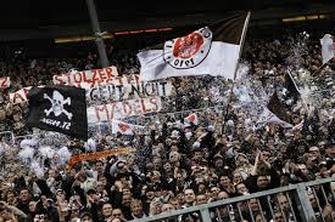So I’m guessing that I stopped going to every game sometime in the early 00s, and my attendance since has been limited to special games and those to which I was invited to share rare roast beef and red wine in the Directors’ Box. I think this is partly because Guy went off to university and Rick Gekoski himself to London, but it is also because of a growing disenchantment with the way football was going: cheats on the park and crooks in the boardroom, as someone – maybe me - has said.
But I still get it. I still get the extraordinary euphoria that football can generate. And I still get the sense of identification of a fan with a club.
Hell, as readers of Staying Up will know, I was part of it. Rick reports my lachrymosity on one occasion and my anger and depression on many, so it must be true. Or at least accurate. And his book records the travails of fans who live for results over which they have no control. It produces the highest of highs and the lowest of lows.
Staying Up is one of the few books which chronicle this from the inside. Nick Hornby’s Fever Pitch is more personal but has the same resonance for fans of any team. A Season with Verona by Tim Parks has a slightly different agenda, using his away trips to develop a theory of national character. And The Miracle of Castel di Sangro by Joe McGinness is about passion and corruption and, incidentally, about the growing involvement of the author in the affairs of the club: from objective reporter to passionate and ultimately disenchanted supporter.
Now, there is a new (or newish) book which addresses these issues. It is by Nick Davidson and it is entitled Pirates, Punks & Politics: Falling in Love with a Radical Football Club. It is a football book but it is primarily a political book, about a club which is a creation and reflection of a left-wing, anti-racist, anti-sexist, anti-fascist and anti-homophobic community from the wrong side of the Hamburg tracks.
Nick Davidson was a Watford fan who, before finding true love with FC St Pauli, looked to non-league football (in the same way as I – somewhat desultorily – tried out Leamington) but found the same kind of squabbles and pettiness in the lower levels as he had identified at the top of the game. In St Pauli, he found a warm welcome from a club and, more importantly, fans (pirates, punks and street politicians) who shared his purist and non-commercial hopes for the beautiful game.
I am late to this bandwagon and, to date, my interest and involvement is limited to checking St Pauli’s result every weekend and watching Youtube footage of the antics of the club’s extraordinary fan base. But one day, I will get to Millerntor.
And I will get there before it’s too late, before St Pauli goes the way of almost every club; its values lost as it finds that the game is merely another cog in the machine.
As all political lives end in failure, so all fans’ lives end in disillusion. But in the meantime, I commend to you all the volumes mentioned above, especially Nick Davidson and Rick Gekoski. While you are reading them, you will be reminded – however briefly – why the beautiful game is, well, beautiful.
Today from the everysmith vaults: Still with Yo La Tengo. This isn’t Mozart – it needs time to appreciate fully.






 RSS Feed
RSS Feed